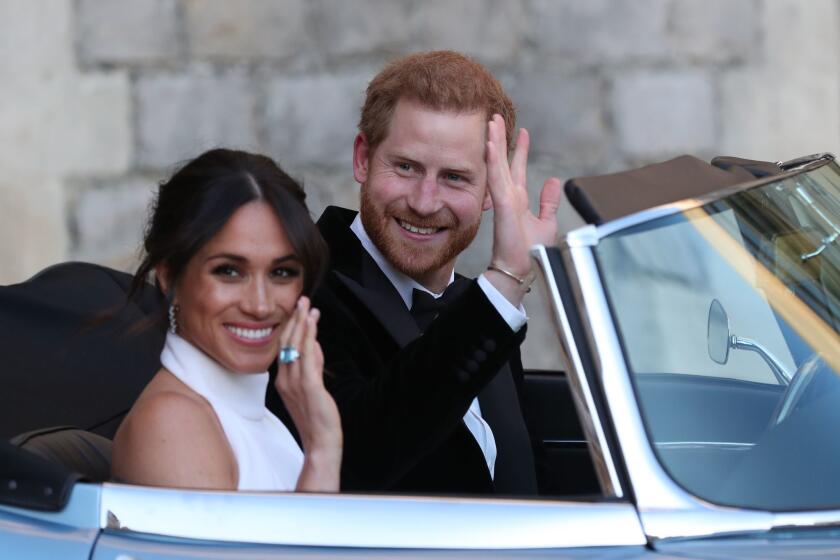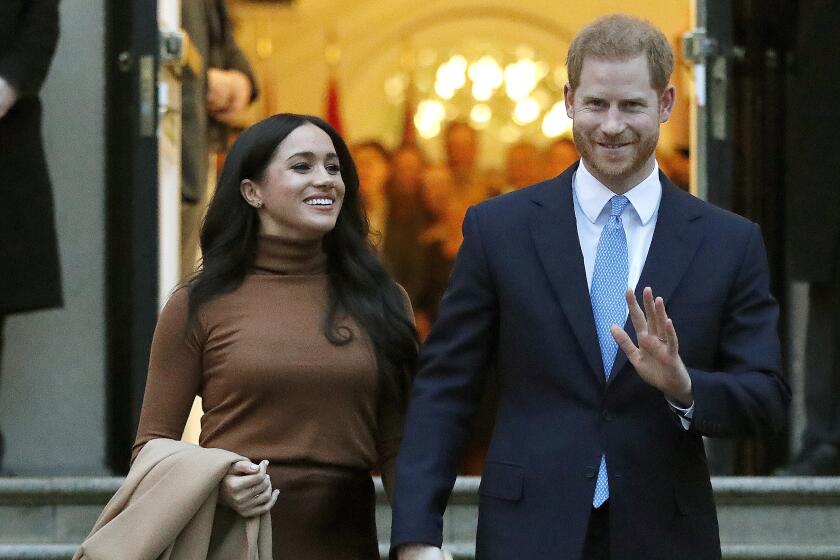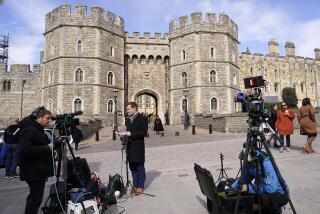Column: After Meghan and Harry’s interview, royal family has to decide what ‘family’ means
No new spouse marries just one person; the whole new family is standing in spirit at the altar too.
With the British royal family, however, the tradeoffs and accommodations for marrying into the Windsors are unimaginably more intense and suffocating, as Meghan, the Duchess of Sussex, made clear in her recent interview with Oprah Winfrey. There isn’t enough bling in the world, nor even the satisfaction of the power to do great good deeds, to make up for it.
Since Queen Victoria and Prince Albert decided 180 years ago to emphasize the “family” in “royal family,” the royals have been expected to be on their best behavior publicly. Performing — Meghan’s own craft as a former actress — is part of the job. The royal family should be what an archbishop of Canterbury said of a royal wedding: “a brilliant edition of a universal fact,” a family like no other.
That made royals into exalted human sacrifices in a devil’s bargain no one could live up to.
Prince Harry and Meghan Markle, Duke and Duchess of Sussex, sat down with Oprah Winfrey for a much-anticipated interview on Sunday. Here are the key takeaways.
You’ve seen “The Crown.” Privately, that family is as messed up as any other, maybe more so. One of the queen’s uncles, the Duke of Kent, was reputedly a cocaine addict before his brother helped him to dry out. Another uncle was epileptic and was cared for away from public view until he died at age 13. Three of the queen’s four children have been divorced.
Yet for decades the understanding was: We’ll take on royal duties if our royal lives are our own. What happens at Windsor, stays at Windsor. Otherwise, the spell, the glamour of monarchy might be broken. The constitutional historian Walter Bagehot warned 150 years ago, “We must not let in daylight upon magic.”
Even a royal giving a news interview, as Prince Charles and Diana did separately during their divorce, was an unwelcome novelty. In 1923, after the queen’s mother got engaged to her prince, she opened her door to a newspaperman — just one. She uttered some innocuous pleasantries, but the palace was livid. The Queen Mother lived another eight decades and never gave another one.
Now tabloids and modern times have broken that compact. And with that Sussex interview, which drew 17.1 million viewers, we now see the wreckage from the backlog of decades of denials and royal priorities. Perhaps it’s time the compact got broken — but at the price of the Sussexes?
Among the highlights from the Winfrey interview, which aired just hours after the queen delivered her Commonwealth Day speech praising the Commonwealth people’s commitment during the COVID-19 pandemic and their “selfless dedication to duty.”
- That Meghan felt sincerely suicidal was shocking. Diana made a couple of cry-for-help suicide attempts, but Meghan saying, “I just didn’t want to be alive any more”? And yet that same night she thought of suicide, she soldiered on glamorously and gamely, showing up dazzling and smiling. She’s right that the monarchy — a timid institution — would fear her getting inpatient mental health care, not because they didn’t want her looked after, but because word might leak to the terrifying tabloids. Thirty years ago, the queen and Charles secretly arranged psychiatric and counseling sessions for the troubled Diana, but no one spoke of it for years. To save itself, would the monarchy again sacrifice its own members, and has that finally backfired?
- The tabloid attacks and public racism endured by Meghan and Harry were and are vicious. A BBC comedian was fired for tweeting a picture of a baby chimp holding hands with a human couple above the caption, “Royal Baby leaves hospital.” The Queen, who has celebrated the diversity of Commonwealth nations in past speeches, presumably saw Meghan’s star value to the Commonwealth “family.” (It’s a mystery, though, why the queen, who summoned news editors for a dressing-down when reporters harassed the pregnant Diana, didn’t do the same for Meghan.)
- Alas, the rest of the royal establishment can be more backward and clueless. A junior princess-by-marriage apologized for wearing a “Blackamoor” brooch to a family lunch that included Meghan. As for the person who asked the Sussexes what color their baby would be? Harry makes it clear it wasn’t his grandmother or his grandfather, Prince Philip, but won’t say who it was. Philip turns 100 in June, and he’s said offensive things before that he thought were jokey.
Meghan and Harry spoke about a family member’s fears that their son might be ‘too brown.’ On Monday, Oprah revealed who they weren’t talking about.
- As non-working senior royals, Harry and Meghan wouldn’t automatically be entitled to SO14 royal security protection, but it would be shortsighted of the palace not to order it. What could be worse PR than some monster carrying out a threat? As a divorced woman, Diana, the Princess of Wales, refused royal protection, convinced she would be spied on. She was probably right, but as a result, she was left unprotected, with disastrous consequences.
- When Archie was born, the Sussexes sounded as if they wanted him to be unencumbered by titles. Meghan now says, “It was not our decision to make.” HRH titles can be convoluted. In 1917, King George V pared down the number of HRHs, and decreed that — stay with me — the grandchildren of the male sons of the monarch are princes and princesses but not the great-grandchildren, except for a male in direct line of succession, like little Prince George today. But the sovereign can bestow those styles and titles, as she did for all of William and Kate’s children. Archie, as eventual grandson of King Charles III, could get to use HRH, but maybe not.
Oprah Winfrey’s sit-down with the Duke and Duchess of Sussex lays bare Britain’s divides over race, class and culture.
For Britain and for everyone following its royal family, the question is not, “does it want a monarchy?” But rather what kind of monarchy? Does it want a 21st century royal family, confessional about its flaws and heartaches? Or one that gets on with the job and keeps its private matters private?
Is the petrified upper lip of past royal protocol a handicap now? And could the palace, by being too inflexible to keep the Sussexes in the royal circle — if the Sussexes really wanted to stay — have lost two people who could have helped remake the monarchy, and so too save it?
CBS’ special with the Sussexes was the highest-rated gender reveal party ever (it’s a girl!) and a reminder that Winfrey remains the interview queen.
More to Read
The biggest entertainment stories
Get our big stories about Hollywood, film, television, music, arts, culture and more right in your inbox as soon as they publish.
You may occasionally receive promotional content from the Los Angeles Times.












